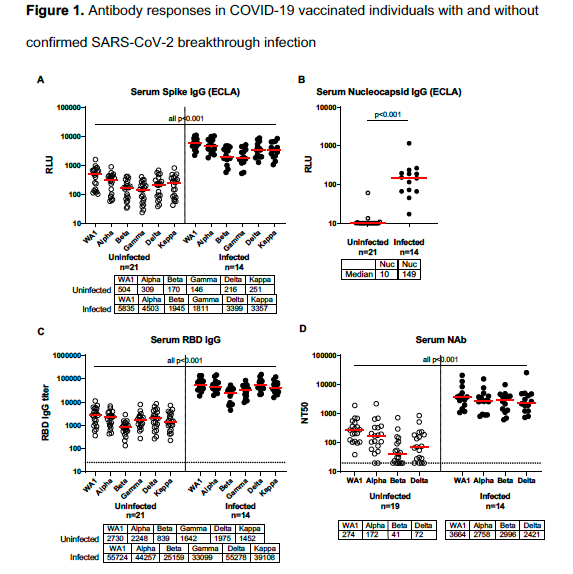A: YES!
We’ve gotten this question SO many times recently but had to rely on immunological best guesses (see here).
*FINALLY* we have some real world data from that famous Provincetown, MA outbreak last summer.
The study tested blood and nasal swabs of 35 vaccinated people who were PCR tested during the outbreak investigation, including 14 who tested positive for infection and 21 who tested negative.
All positive cases were symptomatic, but none were hospitalized.
⬇️ TL;DR:
Those infected AFTER vaccination had MUCH higher binding and neutralizing antibodies against several SARS-CoV-2 variants AND higher T-cell responses compared to vaccinated but uninfected people.
Even though this is a small study, we are grateful to get our hands on some actual data on how infection AFTER vaccination may impact immune response and whether it acts as a “boost.”
The study takes a very comprehensive look at immune responses, measuring both binding and neutralizing antibodies against multiple variants as well as T-cell responses against the delta variant spike protein. In a smaller sub-sample, the study even looked at mucosal IgG and IgA antibodies from the nasal swabs, finding that those infected had higher levels of protection in the nose, an important first line of defense.
💥The magnitude of the immune response differences was IMPRESSIVE.
Vaccinated-infected people had 28-fold higher binding antibody titers, 34-fold higher neutralizing antibody titers and 4.4-fold higher Spike-specific CD8+ T cell responses against the SARS-CoV-2 delta variant compared to vaccinated uninfected (see figure below).

As we’ve previously discussed, we don’t have specific correlates of protection to know exactly what these boosted levels mean for future infection risk, but the author’s state “we speculate that the extraordinarily high antibody titers observed in vaccinated individuals who develop breakthrough infections may lead to subsequent long-term protection in those individuals.” 🙌
💥The magnitude of these antibody differences was similar to the increase seen in the Moderna booster trial, suggesting these symptomatic post-vaccination infections *may* act similarly to a booster shot. (See here.)
Does this mean you don’t need a booster if you’ve had a post-vaccination infection? This is still TBD. If you are in a priority or “recommended” group, a booster is advisable. But those at lower risk may not need to be in a rush to boost if they’ve had a recent infection.
This is the very first data to come out on this question, so we still have much to learn and it’s unlikely guidance will change soon. So far health agencies have done poorly at incorporating information on infection *prior* to vaccination into existing guidance, for a variety of reasons including variable immune response and the logistics of confirming previous infection. But the Nerdy Girls can dream of more nuanced and nimble approaches 😉.
Still, this is GOOD NEWS that while suffering an infection post-vaccination is not fun, it does in fact re-activate the immune system in a way that is likely to boost protection in the longer run.
⚠️ Caveats:
This is a small study of recruited volunteers who attended the Provincetown July 4th festivities and were tested as part of the public health outbreak investigation. Participants were primarily white males vaccinated a median of 5-6 months prior. We have no pre-infection antibody measures, so we can’t see how the *same* person’s immune response changes after an infection. Instead, we can see how the infected vaccinated group differs from the uninfected vaccinated group. We also don’t have ALL the comparisons we might want. Ideally, we would also compare these levels to unvaccinated individuals previously infected, those vaccinated with previous infection (so-called “hybrid immunity”) and also individuals who have now had three doses of vaccine. Thanks to the Delta surge we expect more studies like this will be coming out soon.
⬇️ BOTTOM LINE: Getting infected after vaccination likely considerably boosts your immune response against SARS-CoV-2.
Love,
Those Nerdy Girls


